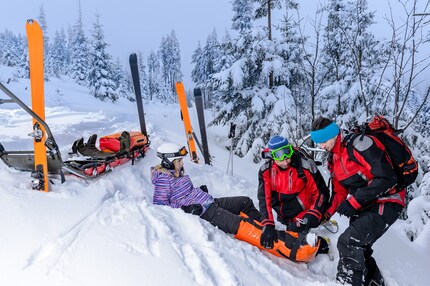
Background information
Why the 10-per-cent rule in jogging is actually wrong
by Siri Schubert

Every year, almost 190,000 accidents occur in Switzerland during sport and games. That’s what the statistics from Switzerland’s national accident insurance provider show. According to Suva, 18 per cent of these are snow sports accidents.
The new professional ski season began at the end of October with the giant slalom in Sölden, Austria. In the meantime the first snow has settled here in Switzerland. Time to get your skis and snowboard out of the attic or cellar and plan your winter holiday in the mountains. Some people might even take the opportunity to book a stay in hospital as a precaution.
The figures from Suva on annual non-occupational accidents in Switzerland are impressive: last year there were around 600,000 such accidents, an increase of around 65,000 compared to 2021. A good third of these occur during sports and games, 18 per cent of which are snow sports. In total, these sports accidents cause running costs of over one billion Swiss francs every year.
At the Zurich Alphaclinic (website in German), orthopaedic surgeon Dr. Marcel Gloyer, among others, treats the victims of such winter sports accidents.

After a weekend of good weather in winter, Mondays are often very busy at his practice, says Marcel Gloyer. Several patients who have twisted their knee or injured their shoulder on or off the slopes come in. Most of the time, it’s because the skiers and snowboarders aren’t fit enough. In addition to this, many people simply don’t know how to use their high-tech equipment properly. A lot of people are geared up with equipment that just a few years ago was strictly for professionals. This increases the speed and therefore the risk of accidents.
Most of the accidents on the slopes are self inflicted. Only around a fifth of accidents are down to external influence. «I was knocked down by someone on the slope» only applies in 20 per cent of cases. When orthopaedic surgeons ask their patients how the accident happened, there are usually two types of answers. The stupid accident: someone gets off the lift, someone else stands on their skis, the lift pushes on and the knee is twisted. Or: it’s the first descent of the holiday, they don’t have control over their equipment yet and they crash. And here too, it’s usually the knee that’s injured.
In the second kind of accident, (excessive) speed plays a role. According to Marcel Gloyer, this generally results in combined injuries whereby several parts of the body are affected. Often also the head. Torn cruciate ligaments or menisci, torn inner ligaments and shoulder joint injuries usually keep him on his toes otherwise.

If you take a closer look at the Suva figures, you’ll notice that skiing mainly affects the lower extremities, while snowboarding often affects the upper extremities. And: sledging is far more dangerous than any other winter sport. More accidents happen with sledges than with skiing, snowboarding and cross-country skiing combined. Marcel Gloyer is all too aware of this at his practice. He rolls his eyes when the subject comes up and says: «Just don’t go sledging.»
Inadequate physical fitness also plays into the hands of injuries. Doing little or no sport all year round and then going all out during the ski holidays is not a good idea. The sports orthopaedist therefore recommends specifically building strength and endurance at least a few weeks before the ski holiday. The main focus should be on good stability of the core muscles. In other words, get planking! For beginners, a maximum of 30 seconds using your forearms is sufficient; over time, this can be increased to two minutes or more.
And then it’s also important to warm up briefly before setting off and get the body up to operating temperature, explains Marcel Gloyer. There are countless short exercises to warm up the muscles. We all know this from our own experience: you arrive at the top after ten minutes on the chairlift, chilled to the bone, or have been carted up the mountain for ages in one of those giant gondolas, like a sardine in a can. Becoming stiff and chilled in the process, you set off. A crash is often inevitable.
The doctor also has a clear stance on the (taboo) subject of alcohol on skis and snowboards: anyone who causes an accident on the slopes while drunk is liable to prosecution. That’s why you should postpone the mulled wine or coffee schnapps to the après-ski in the evening.
And finally, the doctor’s advice: if the joint is swollen, blocked or unstable after an accident, it’s time to see a specialist. In most cases, something’s not quite right and an MRI (magnetic resonance imaging) should be performed.
Cover photo: Shutterstock / Jan Nedbal
From radio journalist to product tester and storyteller, jogger to gravel bike novice and fitness enthusiast with barbells and dumbbells. I'm excited to see where the journey'll take me next.
Interesting facts about products, behind-the-scenes looks at manufacturers and deep-dives on interesting people.
Show all